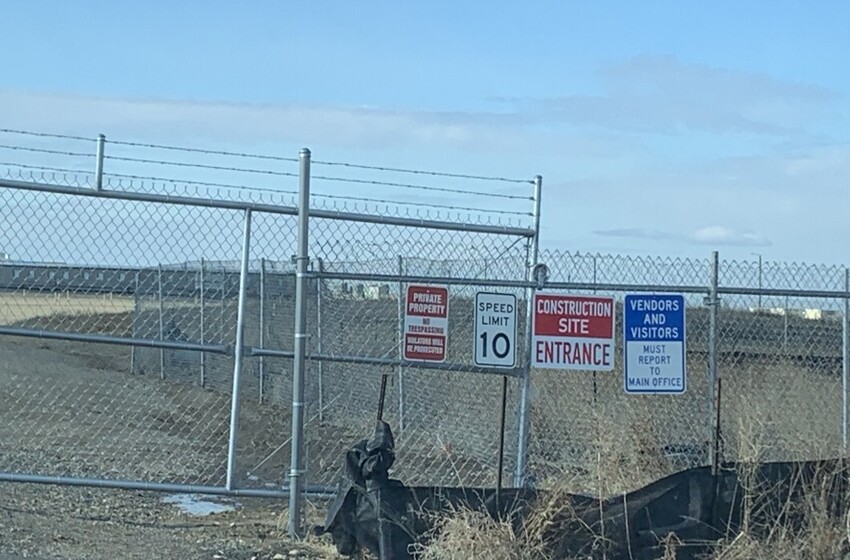Scrapping Keystone XL pipeline makes Biden a tribal hero, but villain off reservation

There are a handful of similar ‘man camp’ sites scattered around the state. (Washington Examiner)
In one of his first acts as commander in chief, President Biden stopped the construction of the $8 billion Keystone XL oil pipeline. In the third part of this series, “Pipe Dreams Lost,” the Washington Examiner investigates the monumental decision’s effect on the indigenous population, who have largely celebrated the news.
PHILIP, SOUTH DAKOTA — On a blustery winter day in South Dakota, the security guard stationed at the “man camp” outside the tiny town of Philip isn’t in the mood for pleasantries.
It takes him about 90 seconds to get into his white pickup truck and make his way over to the chain-link fence. He’s in no mood to talk. He doesn’t even break a smile.
He points to the red and white “no trespassing” sign and makes a gesture to leave. His job is to make sure no one steps foot on the mostly abandoned work site built to house workers of the Keystone XL pipeline. He seems to be succeeding.
There are a handful of similar “man camp” sites scattered around the state. The blue-collar dorms are made up of mobile homes and trailers set up for people working in remote locations in need of temporary housing. Pipeline laborers often relocate for long periods of time during construction, and the man camps are an alternative to hotels. This particular location has been popular with protesters of the controversial cross-border pipeline project.
In August, a group gathered claiming that the camps would bring drugs, rape, and assault to Philip, the nearby Cheyenne River Reservation, and Rapid City, which is about 86 miles away.
“Every time there’s an extraction from Mother Earth, indigenous women are most impacted,” Candi Brings Plenty, the indigenous justice organizer for the American Civil Liberties Union, said. Brings Plenty was the legal observer during the protest organized by the Cheyenne River Grassroots Collective.
The group stood outside the camp holding banners that read, “Caution: Illegal Construction,” “Man Camp Brings Violent Crimes,” and “Kristi Noem, we are not a riot.” A fourth read, “We defeated it once, we’ll defeat it again,” a reference to the state’s riot boosting law that revived South Dakota’s criminal and civil penalties for inciting a riot.
A federal judge had found sections of the state’s law unconstitutional in part because they targeted Keystone pipeline protesters, the Rapid City Journal reported. Since the protest, a coalition of indigenous people, including Brings Plenty, as well as environmentalists and a few rural ranchers, have had a lot to celebrate. Their protests and pushbacks have paid off, and the $8 billion pipeline project came to a screeching halt on Biden’s first full day in office when he revoked a key permit needed to finish it.
The pipeline was supposed to carry Canadian crude oil from Alberta to Steele City, Nebraska. It would have connected two points of an existing pipeline, also called Keystone, which carries oil from Canada to Gulf Coast oil refineries. Construction of the XL pipeline began in 2020, and around 300 miles have been completed.
Philimon Two Eagle, a member of the Sicangu Lakota tribe in Rosebud, South Dakota, told the Washington Examiner he doesn’t care how much time has been put into the project and that as far as he sees it, Biden did the right thing.
Two Eagle believes that the land belongs to his ancestors, and he will fight to keep it that way. That means using every legal avenue available to keep Canada’s TC Energy from drilling on it.

“It is our duty to protect Mother Earth, and it will be a 100% no every time on the KXL pipeline,” he said.
Two Eagle believes that if the Keystone XL, or any pipeline for that matter, gets a presidential go-ahead, it would not only be illegal but add to the “historical wrong” against Native Americans.
“We have been here for thousands of years, and our people are buried throughout this country,” he said, adding that there are sacred sites from the “Black Hills in South Dakota to the Carolinas and back.”
The Sicangu Lakotas and the Fort Belknap Indians of Montana were among two Native American communities that sued the Trump administration after it greenlit the controversial 1,700-mile pipeline extension. The lawsuit argued that the administration failed to adhere to historical treaty boundaries and that the pipeline would affect the water on the reservation and desecrate the land.
“It is rare that a promise to our people is kept by the United States,” Harold Frazier, the chairman of the Cheyenne River Sioux Tribe, said following Biden’s announcement.

But not everyone is happy with Biden’s decision.
Thousands of skilled laborers, carpenters, and welders who thought they would have a steady job for at least a year were shown the door on Jan. 20. A lot of the small business owners who invested in the towns around the man camps, towns with pre-pipeline populations anywhere between zero and 700, were also suddenly scrambling.
Even the businesses that had been around and seen a bump in sales because of the pipeline workers have been affected by Biden’s executive order.
“(The pipeline workers) bought everything local,” Neal Petersen, the owner of Petersen’s Variety store in Philip, told the Washington Examiner. “They bought everything they could local.”
He remembers one time when pipeline workers bought all of his plastic kiddie pools.
“EPA said if they run any motors, they had to have something to contain it if they spilled the gallon or can of gas,” Petersen said. “They bought all our plastic pools the kids used in the summertime to set under them, so we sold all of our pools to them instead of the locals that wanted to put their kids in the pool in the yard.”
Lacy Williams, a Philip native who went away to college but moved back to raise her daughter, said she has also seen a jump in activity around town. She also pushed back on accusations that the nearby man camp was a threat to the residents of Philip.
Williams said she watched the protests at the man camp but said, “The only time anyone can recall the cops being called is on the protesters, not the pipeliners.”
For now, the two worlds seem to be at an impasse. Residents and the pipeliners want Biden to change his mind, while the Native Americans and environmentalists want him to keep a lid on the Keystone XL, as well as other pipeline projects.
Opponents of the Dakota Access pipeline, which carries oil from North Dakota to a shipping point in Illinois, want Biden to shut it down. A federal appeals court ruled in January that a more thorough review is needed. Opponents are also stepping up pressure for Biden to strike down Enbridge Inc.’s Line 3 replacement in Minnesota. So far, more than 100,000 people have called on the president to revoke the water permit.
Line 3 starts in Alberta and clips a corner of North Dakota before going into Wisconsin and Minnesota. Line 5 is another issue. It moves 23 million gallons of oil and liquids used in propane from Canada to refineries in the U.S. Then, there’s the Mountain Valley Pipeline, a natural gas pipeline that would run northwestern West Virginia to southern Virginia. Some sections of it are currently under construction, while others are blocked over legal disputes.
His decision to scrap Keystone XL could see him come under more pressure to take things a step further.















